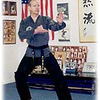David Mitchell (desambiguación)Entrevista
"David Mitchell" está compuesto de al menos 24 autores distintos, dividido por sus obras.
Entrevista con el autor
 David Mitchell is the acclaimed author of Cloud Atlas. His new book is The Thousand Autumns of Jacob de Zoet, a historical novel set on Dejima, the Dutch East India Company's post in turn-of-the-19th-century Japan. Jacob de Zoet, a young Dutch clerk, finds himself falling for a Japanese midwife and caught up in a world entirely different from what he's known. Love transcends culture, Japan's closed society and de Zoet's fiancee back home. Longlisted for the Man Booker prize and already a New York Times bestseller, The Thousand Autumns is currently the #1 most popular book on LibraryThing. The book's website is here.
David Mitchell is the acclaimed author of Cloud Atlas. His new book is The Thousand Autumns of Jacob de Zoet, a historical novel set on Dejima, the Dutch East India Company's post in turn-of-the-19th-century Japan. Jacob de Zoet, a young Dutch clerk, finds himself falling for a Japanese midwife and caught up in a world entirely different from what he's known. Love transcends culture, Japan's closed society and de Zoet's fiancee back home. Longlisted for the Man Booker prize and already a New York Times bestseller, The Thousand Autumns is currently the #1 most popular book on LibraryThing. The book's website is here.
Mad-Lib Author Blurb: David Mitchell lives in West Cork, Ireland with his family. He forgets things when he's not remembering them.
There are many languages at play in the novel—the Dutch speak to the Japanese through interpreters, the Japanese to each other, and the Dutch to each other, of course—but we read it all in English. How was that to write? Do you speak Dutch or Japanese? Was any of the dialogue originally written in another language, or was it always in English?
Oh, it was a nightmare to write—really, every sentence was an obstacle course.
Rightly or wrongly I feel that my ear for contemporary dialogue is one of my strongest suits, and to be unable to use that faculty—to be unable to write in a novel like I'm writing this email now—felt like running a marathon with 20 kilos strapped to my back. What do you do with idiom or slang? How do you flavour language?
I speak Japanese to an intermediate level, and I learnt enough Dutch to know a little how the language works, but not enough to converse. (Did you know by the by that 'to let the cat out of the bag' in Dutch is 'to let the monkey out of the sleeve'? Isn't that cool?)
The monkey or the British Prime Minister? The latter was a young, dynamic PM, and there's lots to admire about him: a pragmatist with enough idealism to help Wilberforce smuggle through the abolition of slavery in the British Empire, despite ferocious opposition from powerful conservatives. Of course, if you happened to be Dutch and an ally/vassal of France during the Revolutionary and Napoleonic Wars, William Pitt was a cunning, opportunistic enemy who was in large part responsible for strangling Dutch shipping and impoverishing your homeland. Hence the monkey on Dejima is named William Pitt. Narratively, William Pitt singlehandedly brings about the novel's first 'cute-meet' (a Hollywood term I only just learnt, meaning the scene in a film where the future romantic interests meet for the first time, tho' being Americans you probably already know this) between Jacob and Orito. William Pitt runs off with an amputated limb. Orito chases William Pitt into a warehouse where Jacob is working alone.
Thanks, monkey.
What inspired The Thousand Autumns of Jacob De Zoet?
The Dejima Museum in Nagasaki; the life of Dutch Chief Resident of Dejima, Hendrik Doeff; Japan itself; my curiosity, which is, as it is for all of us, a law unto itself.
Dejima is physically a tiny space, and the isolation is a big part of the work as a whole. Did you have a map of it in your head as you wrote, and as your characters moved about?
Yes—there are some good illustrations of the place drawn at various stages of its history, and the Dejima in my head corresponds to pictures of the trading post from the 1790s. I even dreamt about the place from time to time.
The Thousand Autumns of Jacob De Zoet is told chronologically—did you actually write the book in that order?
Yes. No jiggery-pokery with the structure or with time, so writing it in the order you read it was the easiest way. The only exception is Weh's first person slave narrative at the beginning of the third section, The Master of Go—not knowing a thing about Malay slaves at the time, and not being able to find any sources in English, I kept putting off and putting off the chapter until my deadline was only a few weeks away. At that point I knuckled down, using North American slave narratives as a model, but I didn't have much time to convert it to the 3rd person, and in the end I thought I'd let it be.
In writing historical fiction, how do you choose what bits are real and which are made up—and manage to maintain a narrative that reads as authentic? What's your research process?
Three questions in one here.
1) You can't change big stuff, like the dates of the Napoleonic Wars or moving the invention of the machine gun. (Actually you can, but then you're into Alternative History, and that's not for me.) You must invent the small stuff—characters' names, their back-stories and their motives, otherwise you'll end up writing biography or history or docu-novel, which I'm glad some people write because I like to read them, but I'm too hungry to make fictional worlds to write these books myself. It's also why I'm a novelist and not an academic—I like making stuff up too much. The medium-sized stuff you can tweak or bend—for example the HMS Phaeton, the British frigate which tried to seize Dejima in 1811 becomes the HMS Phoebus in 1000 Autumns. Though if you do it's good to flag it: Phoebus is Phaeton's father. Or his son?
2) I'm glad you think my narratives reads authentically: it's my job, after all. I tried to get my facts write, not so much about dates as how human needs at the time were met—food, light, sex, drink, companionship, a living wage, shelter, medicine, communication and so on. There's a lot of work involved in finding all those things out, but if you get it right your reward is a world that smell and feels and sounds and looks authentic. Language is the key—how do these people speak, to superiors, to peers, to the serfs? Inside their own head? If you get that too authentic they'll sound like Blackadder, but if it's wobbly with anachronisms and neologisms it will crash. You have to invent a plausible dialect of 'Bygonese', and vary it between classes and genders and individuals, so that everyone isn't speak in the same voice. A tall order, yes, but easily-written books often resemble one another.
3) Research process? Read and take notes. Look things up like 'the history of shaving foam' on the internet, and try not to lose the morning.
From member bcquinnsmom: I want to know where you got the idea for the "engifting" religious order. Did you make it up, or is it based on something historically real?
Thanks for your question member bcquinssmom. I'm glad to tell you that I made it up. Though if the human imagination can conceive of a thing, then it's probably been tried at some point, somewhere, in our predatory, bloodstained, bonkers history.
As an author, your work doesn't seem to stick to any one genre. Do you set out to write with a certain type of novel in mind?
All I do is to set out to make the novel I am thinking about, and make it work. I know when it isn't working. I'm less sure when it is working. If it doesn't sound too pretentious, it's the novel that decides which genre it is. The flickerings of the supernatural at the core of 1000 Autumns, for example, weren't there when I started out writing a straight(ish) historical novel, but they became necessary as I went on.
From member graffiti.living: As a writer who has lived and worked in Japan at different times in your life, please could you talk a little more about your experiences in Japan and the impact that this has had on your writing?
Trickier to discuss this subject 'a little', graffiti.living, than it would be to discuss it for hours. Living in Japan interiorises one, because it is an interiorising culture—if every Japanese citizen expressed his or her own individuality in queues, in shops, on roads, in the family etc to the same degree American citizens do, the place would ignite and explode—imagine 120 million people cooped up on an area of buildable-upon land about the size of, I dunno, Florida?
Writing, too, is an interiorised and interiorizing activity: you live with thoughts, and characters formed, like clay models, from bundles of thoughts, for months or years of your life.
So just living in Japan during my 20s, when the writer who I am was forming, was probably a useful form of isolation. The place itself filled a mental warehouse of raw material, including Dejima, which I'll probably draw from, to a greater or a lesser extent, for the rest of my life. Finally there are the writers as a result of being in Japan: Haruki Murakami, Tanizaki, Soseki, Mishima when he isn't being a homoerotic misogynist, Endo—good writers all. Japanese pop culture has kicked up some gifted fantasists, too—Taiichi Yamada (track down a book called Strangers if you're curious—I think you'll like it), Akutagawa, the director Hayao Miyazaki. Japan gets under the skin of the young, and it never quite comes out.
From member marvas: You were in The Netherlands to research The Thousand Autumns of Jacob de Zoet, do you think that the seventeenth century Dutch as you found them in your research were very different from the Dutch now? Is there such a thing as Dutchness? Why do you think it is that the Dutch used to travel the world in search of opportunity, whereas now they seem to be afraid of everything foreign and strange?
Big question, Marvas. First off, I'm no expert on the Dutch, but to attempt a very rough sketch, I'd say the Dutch can be as (comically) blunt as Germans, as pragmatic as Texans, as crafty as Klingons; and were as venal colonizers as the British, and often better organized with the resources available. They also knew how to set up and maintain a monopoly, from nutmeg to quinine. The modern Dutch, to my perhaps naive foreign eyes, seem to run their state along more principled lines. Sure, there are glaring exceptions, but compared to many other EU countries the Netherlands look pretty sane to me. The fact that the answer 'no' is not good enough an answer to your question 'Is there such a thing as Dutchness?' indicates to me that yes, there is such a thing as Dutchness. Tricky to define, and much cultural DNA is shared with the Germans and the Brits, but that doesn't mean Dutchness doesn't exist.
The Dutch used to travel the world in search of opportunity because nature gave them nothing but mud and storms—even the Romans didn't quite see the point of incorporating Batavia fully into their empire, right? So the Dutch had to invent new ways of making money: the stock exchange, the futures market, hydroengineering, harnessing wind power—not just for milling and drainage but for industrial processes like sawing; and a mercantile empire built on wholesale transportation between India, the East Indies and China.
What happened? The world changed, other countries caught up, the Javanese wanted their country back thank you very much, but that doesn't mean the Dutch now are 'afraid of everything foreign and strange'. If that were true, how come you all speak 3 or 4 languages?
And if you're referring of the Dutch withdrawal from that festering unwinnable murderous quagmire currently draining our dwindling resources, killing our soldiers, corroding our once-bright reputations as sane democracies in Afghanistan and self-evidently not Making Us Safer, well, I only wish the new British government could show as much good sense, however belatedly. Right, off my soapbox.
What's on YOUR bookshelf?
Recent past, right now and soon to be read: A House for Mr Biswas by VS Naipul; The Good Soldier Svejk by Jaroslav Hasek; Collapse by Jared Diamond; Rob Chapman's autobiography of Syd Barrett, A Very Irregular Head; Emily Dickinson's poems (by my bed so I can read some if I wake early and don't want to wake my wife by getting up); One Day by David Nicholls; Vincent van Gogh's letters; John le Carre's new one; re-reading my (freshly signed by the wonderful entity herself) copy of Ursula le Guin's The Left Hand of Darkness; The Voyage of Saint Brendan (in which the saint actually meets Judas Iscariot); Alberto Angela, One Day in the Life of Ancient Rome; Jim Crace, Being Dead; Andrew Smith, Moondust. Enough for now?
—interview by Abby Blachly




